
Binocular vision dysfunction (BVD) is a condition where your eyes are unable to work together effectively. This can lead to a range of vision-related problems that can impact your daily life. BVD occurs when your eyes are not properly aligned or coordinated, causing them to strain to focus and work together.
Causes and Symptoms of BVD
The causes of binocular vision dysfunction can vary, but some of the most common include:
Strabismus: A misalignment of the eyes, where one eye turns inward, outward, up, or down.
Convergence insufficiency: The inability to keep your eyes properly aligned when focusing on a close-up object.
Accommodative dysfunction: Difficulty adjusting the focus of your eyes to see clearly at different distances.
Refractive errors: Conditions like nearsightedness, farsightedness, or astigmatism that can contribute to BVD.
Traumatic brain injury: Head injuries, such as from a car accident or a fall, can disrupt the coordination of your eyes.
The symptoms of binocular vision dysfunction can be varied and can often be mistaken for other vision or health problems. Some of the most common symptoms include:
Blurred or double vision
Headaches or eye strain
Difficulty with depth perception
Difficulty reading or using a computer
Dizziness or nausea
Fatigue or difficulty concentrating
If you are experiencing any of these symptoms, it's important to seek evaluation from an optometrist who can properly diagnose and treat your condition.
The Impact of BVD on Daily Life
Binocular vision dysfunction can have a significant impact on your daily life, making it difficult to perform even the most basic tasks. Simple activities like reading, using a computer, or driving can become challenging and uncomfortable. You may find yourself struggling to focus, experiencing frequent headaches, or even feeling dizzy or nauseous.
The impact of BVD can also extend beyond just your visual function. It can affect your overall quality of life, making it harder to engage in hobbies, work productively, or even maintain social relationships. The strain and discomfort caused by BVD can lead to fatigue, irritability, and difficulties with concentration and memory.
If left untreated, the impact of binocular vision dysfunction can worsen over time, making it increasingly difficult to function effectively in your daily life. That's why it's so important to seek professional help and explore treatment options like vision therapy.
What is Vision Therapy?
Vision therapy is a specialized form of treatment that can help address the underlying causes of binocular vision dysfunction. It is a non-surgical, customized program of visual activities and exercises designed to improve the coordination and function of your eyes and brain.
Vision therapy is typically administered by an optometrist, who will work with you to develop a personalized treatment plan based on your specific needs and goals. The therapy may involve a combination of in-office sessions and at-home exercises, all aimed at improving your visual skills and reducing the symptoms of BVD.
How Vision Therapy Works to Address BVD
Vision therapy works by targeting the root causes of binocular vision dysfunction, helping to retrain and strengthen the coordination and function of your eyes and brain. Here's a closer look at how it works:
Evaluation and Diagnosis: Your eye doctor will conduct a comprehensive evaluation to assess the specific issues contributing to your BVD, such as eye misalignment, convergence problems, or accommodative dysfunction.
Customized Treatment Plan: Based on the evaluation, your doctor will develop a personalized vision therapy program tailored to your needs. This may include a combination of in-office sessions and at-home exercises.
Visual Exercises and Activities: During the in-office sessions, you'll engage in a variety of visual exercises and activities designed to improve the coordination and function of your eyes and brain. These may include using specialized lenses, prisms, or other tools to retrain your visual system.
At-Home Practice: In addition to the in-office sessions, you'll be given a series of at-home exercises to practice regularly. These exercises help reinforce the skills and progress made during the therapy sessions.
Ongoing Monitoring and Adjustment: Throughout the vision therapy process, your doctor will closely monitor your progress and make adjustments to your treatment plan as needed to ensure optimal results.
By addressing the underlying issues that contribute to binocular vision dysfunction, vision therapy can help improve your visual skills, reduce symptoms, and enhance your overall quality of life.
Get Started with Clarendon Vision Development Center Today
At Clarendon Vision Development Center, we are dedicated to providing exceptional care and treatment for individuals struggling with binocular vision dysfunction. What sets us apart is our comprehensive, individualized approach to vision therapy. We take the time to thoroughly evaluate your visual system and develop a customized treatment plan that addresses the specific issues contributing to your BVD. Our in-office sessions and at-home exercises are designed to retrain your eyes and brain, helping you regain control over your visual function and improve your overall quality of life.
We understand that the journey to better vision can be a challenging one, we provide ongoing support and guidance throughout the entire vision therapy process. We are dedicated to ensuring that you achieve the best possible outcomes and feel empowered to take control of your visual health.
If you're struggling with the symptoms of binocular vision dysfunction, contact Clarendon Vision Development Center to schedule a comprehensive evaluation and learn more about how our vision therapy program can help you achieve the clear, comfortable vision you deserve. Visit our office in Westmont, Illinois, or call (630) 323-7300 to book an appointment today.



